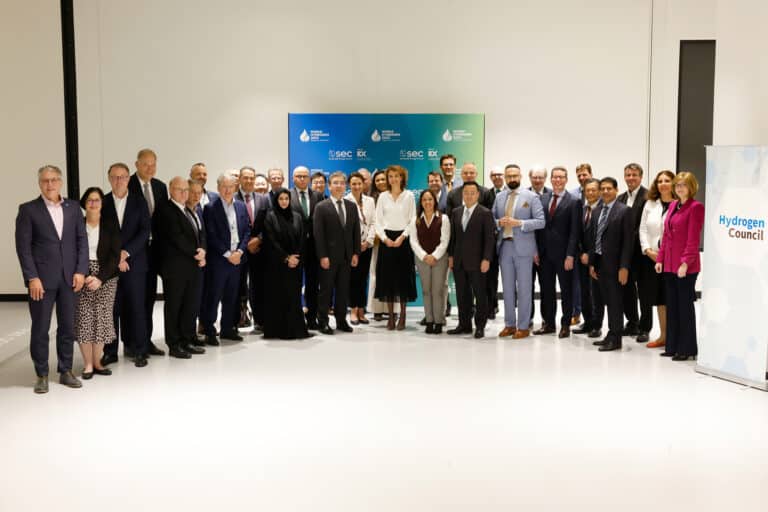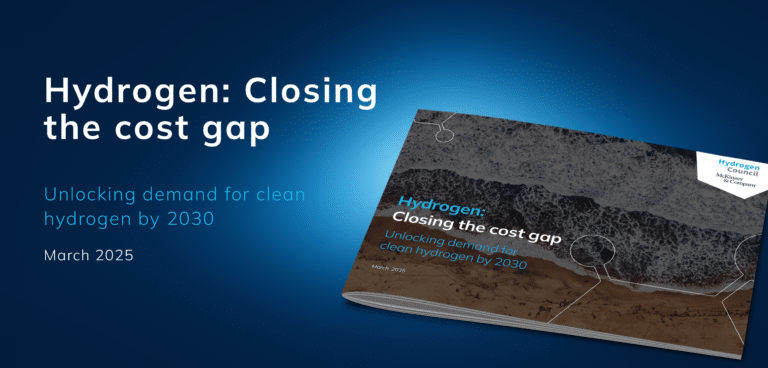Daimler Truck was one of 13 founding members of the Hydrogen Council when the global CEO-led initiative was created in 2017. Why did Daimler Truck want to be a part of the Hydrogen Council?
We as Daimler Truck strive to lead sustainable transportation with a clear commitment to two drive technologies: battery-electric and hydrogen-powered trucks and buses. As a result, we invest in hydrogen technology on a grand scale.
By 2026, cellcentric, our joint venture with Volvo Group, will put in operation one of Europe’s largest production facilities for fuel cells. Moreover, in the second half of this decade, our Mercedes-Benz GenH2 Truck will hit the road, undergoing rigorous testing already.
While it is our business to develop the trucks, it is beyond our business to produce and supply sufficient green hydrogen. We need to work together on a global scale to make sure that the necessary investments and developments along the entire hydrogen supply chain are addressed and pushed forward at the same time. In that respect, the Hydrogen Council has a leading role in the development of the hydrogen framework.
What does it mean to Daimler Truck to be a founding member of the Council?
The goal is clear: In order to meet the Paris Climate agreement, economies around the world have to become CO2-neutral by 2050. Building a hydrogen economy is decisive to get there. Being a founding member of the Hydrogen Council allows us to actively shape the discussion, initiate truck-related activities and to jointly accelerate the global deployment of hydrogen solutions required for sustainable transportation. We firmly believe that only through collaboration with key stakeholders along the hydrogen value chain we can make sustainable transportation a reality.
Daimler Truck began testing the first ever liquid hydrogen truck last year. What are the benefits of using liquid hydrogen?
We clearly prefer liquid hydrogen in the development of hydrogen-based drives. Liquid hydrogen has a higher energy density than gaseous hydrogen. As a result, more hydrogen can be carried, which significantly increases the range and enables a vehicle performance on eye level with a diesel truck.
The development objective of the series-ready GenH2 Truck is a range of up to 1,000 kilometres and more. This makes the truck suitable for flexible and demanding applications, especially in the important segment of heavy-duty long-haul transport.
Daimler Truck celebrated the first successful liquid hydrogen refuelling of the truck together with Air Liquide, another founding member of the Hydrogen Council. Is it more partnerships like this that the hydrogen market needs to get the technology into the mainstream?
Partnerships are crucial to get hydrogen technology on the road at scale, not just with one player. With Linde, who is another founding member of the Council, Daimler Truck has been developing the next generation of liquid hydrogen refueling technology for fuel cell trucks for some time. With this cooperation, we aim to make hydrogen refueling as easy and practical as possible.
In the field of infrastructure for hydrogen filling stations along important transport routes in Europe, we work together with companies like Shell, BP and TotalEnergies, all Steering Members of the Council as well.
What needs to happen next to support the hydrogen sector?
Hydrogen is urgently needed for a sustainable, international energy market. We see new announcements of significant investments into hydrogen almost every day – but we need more to enable an era of renewable energies with green hydrogen.
Alongside we also need a practicable and supportive regulatory framework for producing green hydrogen, transporting and distributing it.
In Europe, we see some key regulations where this framework has to be defined. One is the RED II Renewable Energy Directive (RED II), which is currently under revision and the EU Parliament’s position is heading in the right direction, setting strong targets, which we need to achieve out climate goals. However, we also need a supportive and not too bureaucratic approach in the delegated act of the RED II to accelerate investments in hydrogen production plants.
Moreover, with H2 Global we have a strong and effective supporting scheme to commercialize hydrogen production and supply much faster especially in the ramp-up phase of the hydrogen economy.
Last but not least, with AFIR, the infrastructure regulation for alternative fuels, we can set ambitious targets for hydrogen refueling stations. I highly recommend doing so, to ensure that hydrogen stations are in place where and when our customers need them. This regulation is in the final legislative process. We must not lose time to finalize this law.
About The Hydrogen Council
The Hydrogen Council is a global CEO-led initiative that brings together leading companies with a united vision and long-term ambition for hydrogen to foster the clean energy transition. The Council believes that hydrogen has a key role to play in reaching our global decarbonization goals by helping to diversify energy sources worldwide, foster business and technological innovation as drivers for long-term economic growth, and decarbonize hard-to-abate sectors.
Using its global reach to promote collaboration between governments, industry and investors, the Council provides guidance on accelerating the deployment of hydrogen solutions around the world. It also acts as a business marketplace, bringing together a diverse group of 140+ companies based in 20+ countries across the entire hydrogen value chain, including large multinationals, innovative SMEs, and investors.
The Hydrogen Council also serves as a resource for safety standards and an interlocutor for the investment community, while identifying opportunities for regulatory advocacy in key geographies.
To find out more visit www.hydrogencouncil.com and follow us on Twitter @HydrogenCouncil and LinkedIn.
Joanna Sampson, Communications Manager, Hydrogen Council
joanna.sampson@hydrogencouncouncil.com



